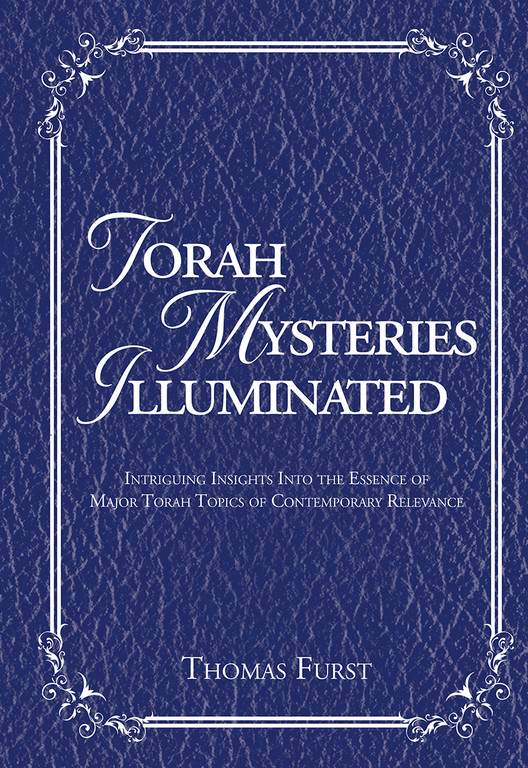Mysteries of the Torah illuminated
This week’s column will focus on a special author and his unique book on Jewish practice and law. The author, Thomas Furst, a lawyer, has the yichus of being a descendent of the great Gaon, the Chasam Sofer.
His religious credentials include having learned at Yeshivat Keren B’Yavneh, and he is currently an active member of the Great Neck Synagogue.
This work, entitled, “Torah Mysteries Illuminated” (Urim Publications, 2015) and accurately subtitled, “Intriguing Insights Into The Essence of Major Torah Topics of Contemporary Relevance” covers the following: Rosh Chodesh — Unraveling the Mysteries of a Most Significant Day; The Meaning of The Land of Milk and Honey; Shevet Levi’s Exemplary Character; Remembering Amalek; Behind the Obligation to Recite One Hundred Blessings; and A Life Saving Mitzvah — Hachnasat Orchim.
In a series of phone and email interviews with Furst, I was able to get the full measure of his scholarship and deep devotion to his faith. Below are some sample teachings for your edification.
In considering Furst’s high regard to honoring guests, consider the following:
“Hachnasat Orchim has a unique status and standing in our faith. The midrash tells us that this mitzvah was so important that Avraham put G-d himself on hold so as to accommodate his ‘guests,’ the three angels. We learn from the Talmud that this mitzvah is more important than greeting the Divine presence itself.”
Among the questions put forward by the author on the topic on honoring visitors are:
“Why indeed is this mitzvah, as distinct from other mitzvoth, more important than greeting the Divine presence? How Did Avraham, who developed his faith in G-d through logic and observation, know this to be so?
“What exactly is Hachnasat Orchim?
“Most people think that this mitzvah is accomplished when we invite a friend for a Shabbat meal. But, is such a relatively mundane activity worthy of being considered a mitzvah so elevated that it trumps greeting the Divine presence itself?
“My response to these questions will hopefully pleasantly surprise you and provide a deeper understanding of what this great mitzvah is all about.”
Further on we consider the author’s take on the observance of Rosh Chodesh.
In the chapter on Rosh Chodesh, I note that it is an important observance on the Jewish ritual calendar. The chapter on Rosh Chodesh begins with eight questions that go to the core of this festival’s goals and teachings. Why is Rosh Chodesh so special as to warrant the recitation of the prayers Ya’ale Veyavoh and the Hallel, both recited on our major festivals. And for that matter, why only in an abbreviated form (the half-Hallel)? And why in fact do we have a lunar calendar, since Jewish holidays are all governed by the solar calendar? These are fascinating questions that generate fascinating answers and teachings.
In the chapter dealing with the recitation of 100 berachot each day, we note that this obligation is surprisingly derived from a Torah verse which does not even mention blessings, nor does it mention the number, 100, nor does it discuss the frequency of this mitzvah. However, a closer analysis of the words of this particular verse teaches us a crucial lesson as to the great religious and ritual significance of this mitzvah.”
This curious methodology follows throughout this valued work, helping you to further your learning and attain a better appreciation of the teachings of our faith.
FOR FURTHER STUDY
Given the increasing violence that we are witnessing in Israel, this week’s Torah reading in Toldot-Genesis, dealing with the relationship of Yitzchak and Avimelech, serves for us as an historical model, a lesson to learn from.
In one of the best English language commentaries, “Unlocking The Torah Text” (page 135) by Rabbi Shmuel Goldin, we learn the following:
“Once again, the Torah text speaks to us in eerily relevant fashion as we recognize that human experience has not changed much over the centuries. The definition of peace, which lays at the core of Yitzchak’s interchange with Avimelech, continues to be at issue today as the State of Israel struggles to live in harmony with its neighbors.
“The failure of the ‘peace process’ in the Middle East is directly traceable to the limited and hypocritical definition of ‘peace’ in the Arab world. True peace cannot take root in countries where children are raised in hate and where the daily rhetoric lauds murderers and spews venom upon the Jewish nation. … We pray for the day when the world will embrace Yitzchak’s vision of true peace.”
This teaching, titled “Toldot, Another Covenant,” was written in 2007.

 44.0°,
Mostly Cloudy
44.0°,
Mostly Cloudy 




